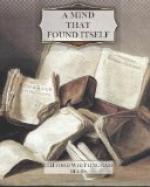“If I should tell you things which you apparently don’t know, you would understand why I am held here,” I said.
“Well, tell me,” he urged.
“Will you promise not to repeat my statements to any one else?”
“I promise not to say a word.”
“Well,” I remarked, “you have seen certain persons who have come here, professing to be relatives of mine.”
“Yes, and they are your relatives, aren’t they?”
“They look like my relatives, but they’re not,” was my reply.
My inquisitive friend burst into laughter and said, “Well, if you mean that, I shall have to take back what I just said. You are really the craziest person I have ever met, and I have met several.”
“You will think differently some day,” I replied; for I believed that when my trial should occur, he would appreciate the significance of my remark. I did not tell him that I believed these callers to be detectives; nor did I hint that I thought myself in the hands of the police.
Meanwhile, during July and August, 1902, I redoubled my activity in devising suicidal schemes; for I now thought my physical condition satisfactory to my enemies, and was sure that my trial could not be postponed beyond the next opening of the courts in September. I even went so far as to talk to one of the attendants, a medical student, who during the summer worked as an attendant at the hospital. I approached him artfully. First I asked him to procure from the library for me “The Scarlet Letter,” “The House of the Seven Gables,” and other books; then I talked medicine and finally asked him to lend me a textbook on anatomy which I knew he had in his possession. This he did, cautioning me not to let anyone know that he had done so. The book once secured, I lost no time in examining that part which described the heart, its functions, and especially its exact position in the body. I had scarcely begun to read when the young man returned and took the book from me, giving as his reason that an attendant had no right to let a patient read a medical work. Maybe his change of heart was providential.




